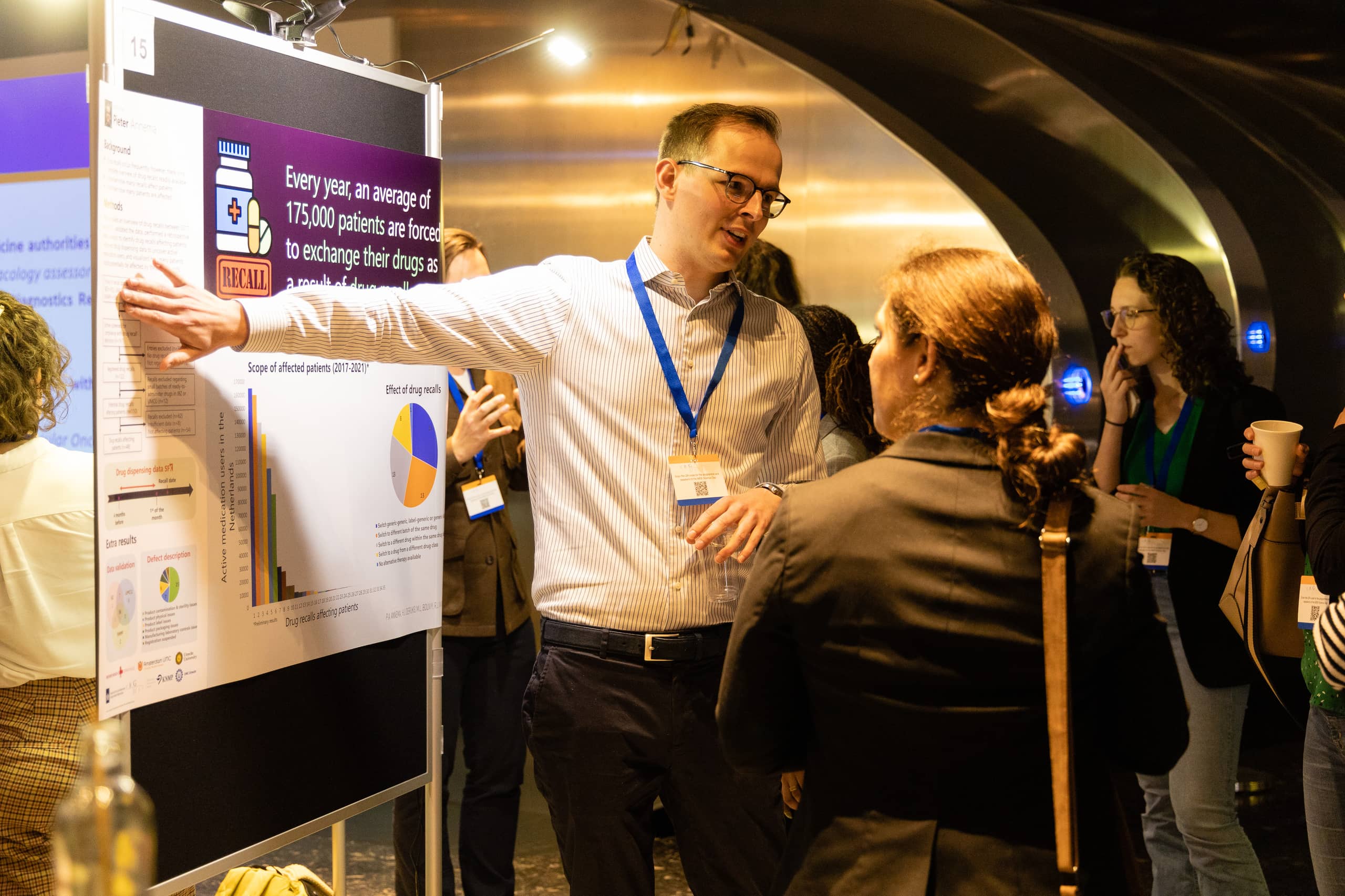This year’s MEB Science Day focused on the future of precision medicine. The use of biomarkers and companion diagnostics plays an important role in the development and assessment of new (personalised) medicines. Several speakers from an academic as well as a regulatory perspective shed their light on current and future developments.
Prof. Eric Boersma, chair of the MEB’s Science Committee, co-chaired the Science Day. After his opening comments, Marjon Pasmooij took the stage as the head of MEB’s Science Department and updated the audience on the MEB Science Programme 2020-2024.
"In 2020, we’ve adopted eight main themes as our MEB Science Policy 2020-2024 ‘Regulating with the Knowledge of Tomorrow’”, Marjon explains. “The themes are widespread and cover the field of medicine development for humans and animals and are linked to the MEB’s main activities, as they are described in our Strategic Business Plan.”
Towards Tomorrow
The 2023 MEB Science Day marks the halfway point of that period.
“We took the opportunity to describe the development in the past years and the progress we’ve made. In a brochure, ‘Towards Tomorrow’, we describe the facts and figures, as well as our research goals linked to the eight themes”, Marjon continues. “It also contains information on other developments. For instance research in differences between males and females in response to medicines, and sustainable development. Additionally, we participate in international projects, like STARS (Strengthening Training of Regulatory Science in Academia) and the European Medicines Regulatory Database (EMRD).” Much of the research at the MEB is conducted by PhD students. “In this brochure we have put them in the spotlight – the brochure contains 22 interviews with PhD students.”
Biomarkers and qualification
One of the eight themes in the Science Policy 2020-2024 is ‘Personalised medicine and biomarkers’, which inspired the 2023 edition of the MEB Science Day. The first half of the programme focused on biomarkers, which play a crucial role in drug development.
Dr. Falk Ehmann kicked of this section with a presentation on the qualification of novel methodologies. As the chair of the Innovation Task Force at the European Medicines Agency he provided the audience with a high level overview on the European procedures and the development of increasingly complex medicines. “We see the convergence of different technologies that lead to new healthcare solutions. Biomarkers are part of a broad spectrum of tools and instruments, and we focus on the qualification of these”, he explains. “We hope to work towards an integrated pathway for these complex solutions, from which both developers and patients benefit.”
Important in qualification of biomarkers is the precise definition of the context of use, to determine what biomarkers are aimed at. Not just Falk Ehmann stresses this, he is backed by PhD student Lysbeth Bakker. She presented a review of EMA’s qualification procedures from 2008 to 2020. “Qualification requires appropriate validation strategies that fit the biomarkers context of use. Establishment of such strategies may benefit from early interactions between applicants and regulators”, she concludes.
The road to implementation
Charlotte Teunissen is Professor of Neurochemistry at Amsterdam University Medical Center. She provided the audience with another perspective on biomarkers. Her research group works on the development of biomarkers for neurodegenerative diseases. She gave a presentation on the development path of fluid biomarkers for Alzheimer’s disease.
Teunissen: “These are biomarkers that can be measured in cerebrospinal fluid (CSF) and plasma in different (preclinical) stages of the disease.” She sketched the roadmap of development, from preclinical exploratory studies to the actual implementation. “Successful implementation depends not just on discovery but also on a thorough validation process. We’re currently knocking on doors to find the right path towards qualification and reimbursement.”
PhD posters
After a few years of online events, this year’s edition of the MEB Science Day was held on location again. That means that several MEB affiliated PhD students got the opportunity to present their scientific posters during the break – but not before they all had an opportunity to do a one minute pitch to the audience. The result was a highly interactive coffee break with lots of discussion around the 16 posters.
Companion diagnostics
Like biomarkers, companion diagnostics (CDx) are inextricably linked to new innovative therapies. A lot has changed in the recent year in the field of CDx and the role medicine authorities have. Senior clinical pharmacokinetic assessor Marc Maliepaard gave a regulatory overview on this topic.
“Until May 2022 CDx were not assessed by regulated authorities. Instead, they were self-certified by manufacturers. The introduction of the EU In Vitro Diagnostics Regulation (EU-IVDR) legislation changed that. CDx in the EU now have to be assessed by Notified Bodies prior to certification”, Marc explains. “As part of the new IVDR, they have to consult the European Medicines Agency and national medicine agencies on the performance and safety of CDx.”
The first year of experience with these consultation procedures and joint assessments shows improvement, Marc says. “EMA, MEB and other national authorities have gained relevant experience with critically assessing the CDx as part of registration procedures.”
But what does the implementation of the IVDR mean for everyday practice in diagnostic laboratories? PhD student Audrey Hermans set out the challenges and concerns. “Hospital laboratories work with either ‘homebrewed’ or commercial products. Criteria like quality, costs and compatibility are very important considerations for those groups. They hope for clear guidelines, for example on tweaked tests, and the exact requirements needed.”
More clinical practice was presented by professor Ed Schuuring (senior clinical scientist in Molecular Oncological Pathology at Groningen University Medical Center). “With the rapid developments in precision medicine, specifically in oncology, decision making with molecular diagnostic testing gets more and more complex”, Schuuring explains. “The number of biomarkers is growing rapidly. For medicine related decision making, it would be good to stop single testing and move towards broad molecular testing. That has challenges, including difficulties in implementation. But it would be a big step forward if we could work towards complete molecular tumor profiles.” An in between step that has been taken is the establishment of eight molecular tumor boards in the Netherlands, multidisciplinary teams including molecular specialists that can discuss patients and treatment programs.
Adverse events and pharmacogenetic screening
Final speaker of the day, Jesse Swen, professor of Clinical Pharmacy and Pharmacogenetics at Leiden University Medical Center, addressed the subject of the use of pharmacogenetics to prevent adverse events. Pharmacogenetics (PGx) is the study of how genes may affect the body's response to, and interacts with medicines. “Personalised medicine can be quite a puzzle”, Swen says. “In the PREPARE-study, that was recently published in The Lancet, we followed up on patients in 7 European countries, in order to monitor clinically relevant adverse drug reactions versus a 12 gene PGx panel. The study showed that using PGx test panels might help to substantially reduce the risk of adverse reactions.”
Panel discussion and recap
At the end of the day, chairman Prof. Eric Boersma led a panel discussion with the speakers. During this discussion and the recap by prof. Peter Mol (Professor of Drug Regulatory Science at University Medical Center Groningen, senior clinical assessor MEB), all participants concluded that there are several factors that can bring biomarkers and companion diagnostics to better use. For example, qualification and validation based on the context of use of the biomarkers is important. Use of data is also key, Peter Mol emphasised: “The difficulties might be in the use and unlocking of data. That, and good collaboration between different partners to successfully implement new biomarkers and CDx will help us take this further!"
All in all, the MEB Science Day 2023 was an inspiring afternoon on review and endorsement of biomarkers and the use of biomarkers and CDx in clinical practice.

